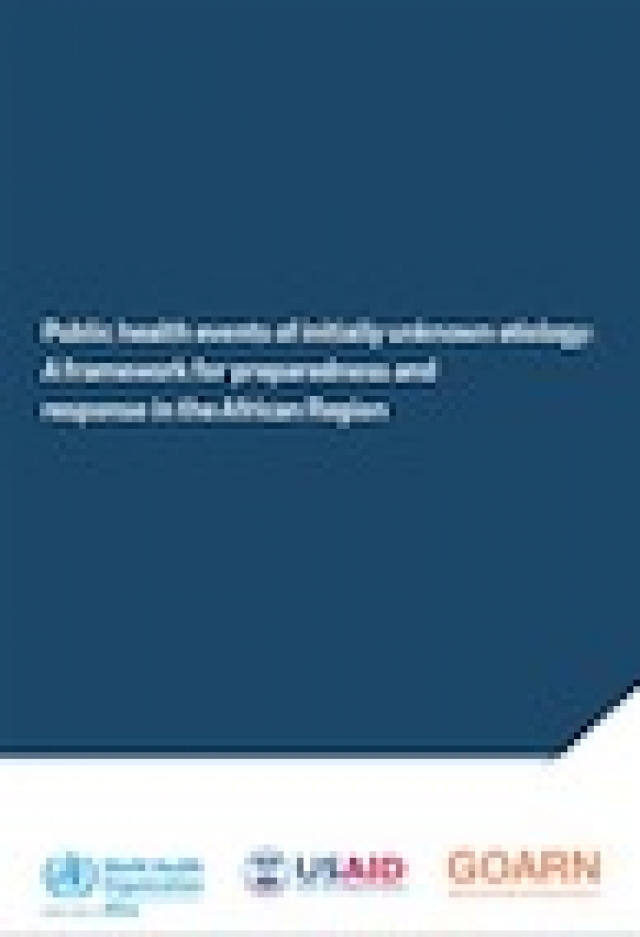WHO/AFRO Issues Guidance on Preparing for & Responding to Public Health Events
 Brazzaville, 13 May - 2014 What is a public health event (PHE)? How can Member States more effectively and efficiently prepare for, and respond to, PHEs which now occur fairly frequently in the WHO African Region?
Brazzaville, 13 May - 2014 What is a public health event (PHE)? How can Member States more effectively and efficiently prepare for, and respond to, PHEs which now occur fairly frequently in the WHO African Region?
These and related questions are answered in a publication entitled “Public Health Events of Unknown Etiology: A framework for response in the African region”.
The 40-page guide provides clear and concise step-by-step guidance for PHE preparedness and rapid response. With this document national governments can build their human resource systems and institutional capacity, as well as define the roles and responsibilities for an efficient and effective multi-sectoral response to PHEs.
These key building blocks of human resource capacity can be applied equally to strengthen a national emergency response task force and to build the human capacity for a fully equipped Emergency Operations Centers. The PHE Framework guides policy makers, Emergency Management Committees and Rapid Response Teams through the steps to intensify their preparedness so that detection is expedited and response efforts will launch on a moment's notice.
The guidance document, just issued by the WHO Regional Office (WHO/AFRO) for Africa in Brazzaville was developed in close collaboration with the United States Agency for International Development (USAID), the United States Centers for Disease Control (CDC) and the Global Out-break Alert and Response Network (GOARN), a partnership of technical institutions which provide support to countries for outbreak response.
WHO defines a PHE as any event that may have negative consequences for human health, including those that have not yet led to disease or illness, but have the potential to do so, and require a coordinated response.
This document focuses on preparedness and response when PHEs first occur, before the causative agent is known, referred to in the document as unknown etiology.
What, one may ask, makes the issue of this publication timely and important?
As noted in the document, an average of 80 to 100 public health events were reported in the WHO African Region between 2000 and 2012. These include infectious disease outbreaks of known or unknown causes, moderate or severe malnutrition, natural and human-made disasters, animal disease outbreaks, and toxins and chemical exposures.
However, this frequency of PHEs is not matched by availability of solid technical guidelines for preparedness and response.
Says Dr. Francis Kasolo, Director of the Disease Prevention and Control Cluster at WHO/AFRO: “There is currently a dearth of guidance related to appropriate steps in the early phases of detection, reporting, alert management, field investigation and response to PHEs.
“Therefore, this concise, easy-to-use technical framework has deliberately set out the modus operandi on how countries, working with various partners can effectively prepare for, and respond to PHEs. This ongoing work to strengthen human preparedness and response capacity is complementary to related efforts to establish the infrastructure for outbreak response, such as Emergency Operation Centers (EOCs).
"The current outbreak of Ebola Viral Disease in West Africa highlights the importance of the publication 'Public Health Events of Unknown Etiology: A framework for response in the African region' which is designed to help countries build their human and institutional capacity for rapid and efficient detection and response to PHEs before they have the opportunity to spread."
Accordingly, the Framework proposes and addresses, in detail, the three phases for responding to a PHE in the African Region.
These are:
Phase 1: Preparedness –This section outlines 8 steps aimed at increasing a country’s ability to respond to a PHE.
Phase 2: Response – This section details 16 alert management steps, 10 field investigation steps and 3 field response steps.
Phase 3: Monitoring and Evaluation - This section deals with monitoring and evaluation, which occurs simultaneously with Phases I and 2.
The Manager of the Epidemic and Pandemic Alert and Response Programme at WHO/AFRO, Dr Benido Impouma, says that the technical and managerial guide is meant for the use of senior level decision makers in Member States, as well as for the members of national Emergency Management Committees and Rapid Response Teams.
He also explains that the Framework is designed to supplement more detailed instructions for response to communicable and non-communication diseases contained in the 2012 edition of the Integrated Disease Surveillance and Response (IDSR) Technical Guidelines, also developed by WHO/AFRO.
Dr Kasolo is confident that the PHE guidance document will go a long way in addressing the challenge that PHEs have posed to countries in our Region over the years.
He says: “My expectation is that the use of these guidelines will enhance country-level emergency preparedness and response capacity, including preparedness to manage PHE alerts before they become a national, regional or international threat to public health”.
The Director of the Pandemic Influenza & Other Emerging Threats Unit at USAID, Dr. Dennis Carroll, agrees: His words: “The PHE guidance document builds on data collected and analyzed by WHO AFRO to identifying the underlying causes of PHEs over the past decade. With this evidence-base, the document speaks to the systems approach needed to appropriately link national PHE response with international initiatives such as the Global Health Security Agenda, the International Health Regulations 2005, and the multi-sectoral One Health approach.
“WHO/AFRO is filling a critical gap with this guidance document, focusing systems and actions to protect the health of Africans and the international community at large.”
____________________________________________________
For more information, please contact:
Dr Benido Impouma; email: impoumab [at] who.int (impoumab[at]who[dot]int) ; tel: +47-241-39773
Samuel T. Ajibola ; email – ajibolas [at] who.int (ajibolas[at]who[dot]int) Tel: +47 241 39378



